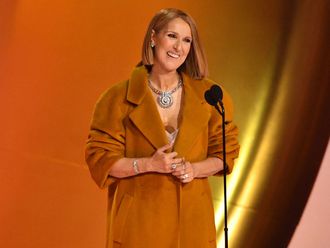
Legendary Chic guitarist and producer Nile Rodgers, who has worked with every major recording artist from Madonna to George Michael to Michael Jackson, is immortalising his tumultuous journey in a BBC documentary dubbed Nile Rodgers: Lost in Music.
The three-part docu-series will air in the UK in April, with further airing dates yet to be announced.
It was motivated by a diagnosis of an “incredibly aggressive cancer” Rodgers received six years ago.
“The doctors, even though they had great bedside manners, they weren’t really optimistic,” Rodgers told Gulf News tabloid! during a roundtable interview on February 20, at the BBC Showcase in Liverpool.
“Sometimes, when you’re diagnosed with a terminal disease, the first thing you do: you get really scared. Then, if you’re lucky, you start to get organised.”
Rodgers, 64, is now cancer-free. He said his father was a brilliant musician who left behind nothing after he died.
“When I was writing my memoir, I tried to go back and just capture anything that I could find that my father had done: nothing. Like, not one manuscript, not one recording. Nothing. It was all broadcast or live gigs. He was a genius,” said Rodgers.
This realisation made him want to leave a physical reminder of his own work: first in his unflinchingly honest 2011 book, Le Freak: An Upside Down Story of Family, Disco and Destiny, and now in a film.
He was also inspired by a documentary on the life of singer-songwriter Paul Simon, who Rodgers calls a close friend and neighbour.
“It’s not like I see him every day — I’m like the worst friend in the world, because I’m always off making a record. But when I would see him, he was always great,” said Rodgers.
“And for a certain period of time he was very aloof and strange. I didn’t quite understand it. Then I saw this BBC doc that explained what had been going on in Paul’s life around that time, and I went, ‘So that’s why he didn’t want to go out to dinner with me that night!’ All of a sudden, it filled in the blanks.”
Rodgers didn’t have a linear plan of what he wanted his own documentary to reveal about his life. He looked at it as turning on the faucet and letting everything spill out.
“I’m a pretty open person — you can ask me anything. It’s all in my book. I didn’t hide anything,” said Rodgers.
In fact, at his first book signing, some readers were angry with him for writing about his mother in such a revealing way.
“I didn’t expose anything. I interviewed [my mum], she gave me that,” he remembered telling them. He called his mother and said, “Hey mum, tell them about the first time you got a coat hanger abortion. What’d the room look like?”
“My mum went, ‘Room? I did it outside, that’s why they used to call them back alley abortions.’ She was totally open, and I think I get a lot of that from her,” he said.
And though there are things he’s done that he’s not proud of, he would “certainly tell you about it, I wouldn’t act like I didn’t do it. Because someone would say, ‘I was there, I saw you do it.’”
Rodgers, more known to a younger generation as the force behind Daft Punk’s Get Lucky, which won the Grammy for Record of the Year in 2014, credits his success to the early discipline he learnt by being a part of disco-funk band Chic.
“If it weren’t for Chic, the other stuff wouldn’t exist. Think about Chic: in just two short years, 1977-1979 — because we were dead after that — but in 1979, we had two No 1 pop records on the Billboard charts,” he said.
“In that short period of time we never had a single, ever, that wasn’t at least gold, and many were platinum, and a few were multiple platinum, and La Freak was the biggest-selling record in the history of Atlantic for 37 years. In two years, we did that. That’s pretty amazing.”












